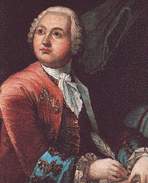 Lomonosov Mikhail Vasiliyevich (1711-65) Lomonosov Mikhail Vasiliyevich (1711-65)
The first Russian scientist-naturalist of universal importance, poet who laid the foundation of modern Russian literary language, artist, historian, advocate of development of domestic education, science and economy.
In 1748 he founded the first in Russia chemical laboratory at the Academy of Sciences. On his initiative the Moscow university (1755) was founded as well. Scientific discoveries of Lomonosov enriched many branches of knowledge. He developed atomic-molecular conception of substance structure. During the domination of teplorod theory he asserted, that heat is caused by movement of corpuscles. Lomonosov formulated the principle of matter and movement conservation. He excluded phlogiston from chemical agents and laid the basis of physical chemistry. Lomonosov examined atmospheric electricity and gravity. He put forward the colour doctrine. He created a number of optical devices. Lomonosov discovered atmosphere on Venus, described the structure of Earth, explained the origin of treasures of the soil and minerals, published a manual on metallurgy. He emphasized the importance of North sea route, research and development of Siberia. Being the deism supporter, he materialistically examined natural phenomena.
Lomonosov was the author of works on Russian history; he criticized Norman theory. Lomonosov was the largest Russian poet-enlightener of the 18th century; he was one of the founders of syllabic-tonic versification. Lomonosov was the founder of philosophical and high civil character Russian ode. The author of poems, epistles, tragedies, satires, fundamental philological works and scientific grammar of Russian, he revived the art of mosaic and production of smalt, created mosaic pictures in cooperation with his pupils. Lomonosov was a member of the Academy of Arts (1763).
Lomonosov was born in November 8 (19 according to New Style) in the village of Mishaninskaya of Arkhangelsk province in a peasant family. He was taught reading and writing early and read a lot. In 1724 he received books: "Grammar" by M.Smotritsky (1721), "Arithmetics" by L.Magnitsky (1703) and "Rhyme psalm-book' by Semeon Polotsky (1680) - which he subsequently called the gates of his erudition.
Lomonosov tried to enter Kholmogorsk school, but he was not accepted being a peasant's son, so he went to Moscow. In 1730, having hidden the background, Lomonosov entered Slavic-Greek-Latin academy, where in 1735 he reached the penultimate course - that of "philosophy". Thorough mastering of Latin and Greek languages opened before him riches of antique and European culture.
In 1734 he listened to lectures in Kievo-Mogilyanskaya academy, studied the Ukrainian language and culture. After returning from Kiev he was sent among other students to St. Petersburg as a student of the university at the Academy of Sciences.
In 1736 Lomonosov was sent to Saxony to study mining. There he got extensive knowledge in the field of physics, chemistry, studied German, French, Italian and English languages, which enabled to get acquainted with the literature of new time. Abroad Lomonosov seriously worked in the field of Russian poetry and created the harmonious theory of the Russian syllabic-tonic verse, which was presented by him in "Letter on rules of Russian versification" (1739) and which is still actual now. He understood, that there wasn't a uniform Russian literary language as well as uniform Russian culture. He decided to do everything possible to lay the foundation of new Russian culture, science, literature and literary language.
After coming to Russia Lomonosov was appointed junior scientific assistant to the Academy of Sciences in physics and in 1745 became the first Russian elected to the professorial post. From 1741 and up to the end of his life Lomonosov worked in the Academy of Sciences. Lomonosov was in constant struggle against I.Shumakher (manager of the academic chancellery), his supporters and successors inimically treated the patriotic activity of the young scientist. Range of interests of Lomonosov was extraordinary wide: physics, chemistry, mathematics, astronomy, engineering, mining, geology, metallurgy, production of glass, mosaic production, geography, history, philology - in each of these fields his contribution is remarkable. Lomonosov wrote major philological works. His "Russian grammar" (1755), which defined features of Russian literary language, was the first real Russian grammar; "Eloquence compendium" is a course of general theory of literature; the treatise "About benefits of church books in Russian language" (1757) is the first experience of Russian stylistics.
Poetry occupies importance place in life of Lomonosov: "Conversation with Anakreon" (1759 - 61), "The Hymn to Beard" (1757), plays "Tamira and Selim", "Demofont", numerous odes.
Caring about distribution of education in Russia, Lomonosov insisted on creation of Russian University of European type accessible to all layers of population. His efforts were crowned with success in 1755 - on his project there was founded university in Moscow, which has been carrying his name. Lomonosov did a lot so that the Russian science developed, gave rise to scientists, so that the Russian professors taught at the university.
In the spring of 1765 Lomonosov caught a cold, fell ill with pneumonia and on April 4 (15 according to New Style) died. He was buried at Lazarevskoye cemetery of Alexandro-Nevskaya lavra in St. Petersburg.
|













 Culture and Art
Culture and Art  Literature
Literature  XVIII century literature
XVIII century literature